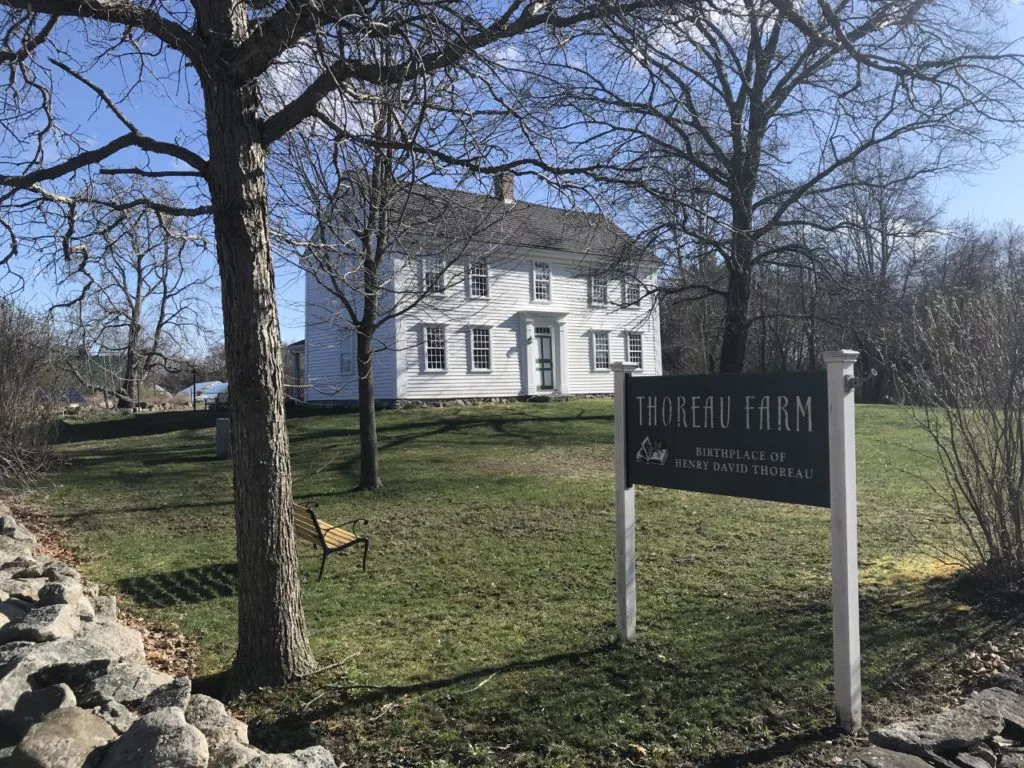Transcendental author and naturalist Henry David Thoreau knew Concord’s trails intimately. He walked daily “to exercise both body and spirit” and observe nature. He felt human connection to wild places was rapidly deteriorating. “Each town should have a park” he argued, “where a stick should never be cut for fuel, a common possession forever, for instruction and recreation.”
A half-mile section of Battle Road Trail from Meriam’s Corner toward Thoreau’s birthplace offers a chance to consider the landscape, now protected as part of Minute Man National Historical Park, and our own view of the world. Thoreau’s words can be our guide.
1: Meriam’s Corner
Thoreau believed the American Revolution was an incomplete quest for human freedom.
“Do we call this the land of the free? What is it to be free from King George and continue to be slaves of King Prejudice? What is it to be born free and not live free? What is the value of any political freedom, but as a means to moral freedom?”
2: Farming Fields
This area was primarily farmland in the Revolutionary era, in Thoreau’s day, and still today under Minute Man National Historical Park’s agricultural leases. Thoreau preferred wildness but admired farmers who managed their land in tune with nature.
“I have faith that the man who redeemed some acres of land the past summer redeemed also parts of his character.”
3: Into the Woods
By 1850, only 11% of Concord’s landscape remained wooded, mostly as small, scattered lots. Thoreau valued forests as an antidote to modern life.
“Our village life would stagnate if it were not for the unexplored forests and meadows which surround it. We need the tonic of wildness.”
4: Upon the Hill
Thoreau knew that Indigenous people lived in areas like this, dry uplands adjacent to low wetlands, and that human life on the land is an ongoing story.
“The earth is not a mere fragment of dead history, stratum upon stratum like the leaves of a book, to be studied by geologists and antiquaries chiefly, but living poetry like the leaves of a tree, which precede flowers and fruit—not a fossil earth, but a living earth.”
5: Wildness
Thoreau felt deeply connected to nature; that all living things were intertwined.
“The earth I tread on is not a dead, inert mass. It is a body, has a spirit, is organic, and fluid to the influence of its spirit, and to whatever particle of that spirit is in me.
6: Birthplace
Just a half mile across these fields is the farmhouse where Thoreau was born on July 12, 1817.
“I have never got over my surprise that I should have been born into the most estimable place in all the world, and in the nick of time too.”
Thoreau loved living in Concord. “Two or three hours walking will carry me to as strange a country as I expect ever to see… The walker in familiar fields which stretch around my native town sometimes finds himself in another world.”

Whether you are returning to Meriam’s Corner or continuing on the Battle Road Trail, consider the many stories woven into this landscape. What story might be next?
Visit Thoreau Farm, the birthplace of Henry David Thoreau, 341 Virginia Road, Concord. More info at: ThoreauFarm.org.
All images courtesy of Thoreau Farm
This article made possible with the support of Thoreau Farm

